Pleasure, Memory, and C. S. Lewis's Wise Alien
(who could teach us all a lot...)
This week I revisited a novel I’d first read in 1983, a gift from my college roommate Mike, Out of the Silent Planet (1938) by C. S. Lewis, part of Lewis’s Space Trilogy, which continues in Perelandra (1943) and concludes with That Hideous Strength (1945). I was in my early 20s when I first read the trilogy, a time when I began exploring Lewis’s fiction and nonfiction, even when I didn’t fully understand it.
Out of the Silent Planet is, of course, fiction, but as most of us would agree, you can find much truth in fiction. Wisdom, however, is a different matter. We often need a significant amount of life experience to fully appreciate the things we encountered when we were young. I had such an experience yesterday revisiting Out of the Silent Planet.
If you haven’t read the novel, allow me to set the stage (and this includes a few spoilers):
During a walking tour of rural Great Britain and looking for lodging, a philologist named Ransom stumbles upon the house of a man named Devine, an old college acquaintance whom Ransom never liked much in the first place. Devine and a scientist named Weston are working on a secret project. Having been interrupted and discovered by Ransom, the two men offer him a room for the night but grow concerned that Ransom has seen too much of their work, which involves space travel.
Before he knows what’s happened, Ransom finds himself kidnapped, trapped inside a space ship headed for a planet called Malacandra where Devine and Weston have some type of malevolent task to complete. Once they land, Ransom escapes from his captors and eventually meets Hyoi, a native being of the planet. As a philologist, Ransom soon learns the essentials of Hyoi’s language and discovers more about the strange creature and himself.
Here's a bit of one of Ransom’s conversations with Hyoi speaking:
“A pleasure is full grown only when it is remembered. You are speaking, Hman (human), as if the pleasure were one thing and the memory another. It is all one thing… What you call remembering is the past part of the pleasure… When you and I met, the meeting was over very shortly, it was nothing. Now it is growing something as we remember it. But still we know very little about it. What it will be when I remember it as I lie down to die, what it makes in me all my days till then – that is the real meeting. The other is only the beginning of it.”
There’s much to unpack here, and while it certainly applies to how we experience and connect with movies, books, music, and other arts, the ideas and concepts in this brief passage run very deep.
On a fairly simple level, think about your favorite movie. You saw it for the first time only once. (Every viewing after that is a rewatch.) In many ways, you will never recapture that initial experience, yet you’ll learn more about the film and yourself each time you revisit or even dwell on it. You’ve heard or said things like, “I’ve watched that move dozens of times, but I always see something new each time I view it.” There’s something in that movie/book/song/etc. that’s worth revisiting, at least to the viewer. Our lives change and things happen to us that shape and mold us, allowing our minds to see those images from a different perspective.
Take, for instance, my favorite movie, The Maltese Falcon (1941). I knew from my first viewing that everyone in the film was lying about something and greatly desired something they didn’t yet have (which wasn’t necessarily the black bird). We understand that because we know, even from an early age, what lies are and that we’ve probably told them either to ourselves or others. Yet we may not completely understand manipulative lies until we’ve believed one. As you mature, you realize you’ve met manipulators like Brigid O’Shaughnessy or someone who mixes historical events with falsehood like Kasper Gutman. We see liars, cheaters, and swindlers all the time, and with each new encounter we learn to better understand the ones we remember from films (especially if they’re as well-written as the ones in The Maltese Falcon).
Hyoi says, “What you call remembering is the past part of the pleasure…” All this from the memory of just one movie.
But this barely scratches the surface. Let’s talk about real relationships with real people.
Hyoi also says, “When you and I met, the meeting was over very shortly, it was nothing. Now it is growing something as we remember it. But still we know very little about it.”
We live in the present. In a manner of speaking we can also live in the past, but those memories were once in the present, otherwise we couldn’t remember them. When we meet someone for the first time, that event may have been quick, almost negligible. Maybe there was little meaningful communication or none at all, just a glance, a meeting of the eyes. Yet that’s the first encounter from which something - for good or bad - grew. Perhaps what we do with that initial moment is what counts.
Maybe that person you were introduced to for 30 seconds ends up becoming your spouse. Or maybe, for whatever reason, you never speak to them again and become obsessed with them, stewing over what could’ve (or should’ve) happened. When Hyoi says “Now it is growing as we remember it,” exactly what is growing could be positive or negative, pleasurable or destructive. But it is growing. Each day adds something to that memory, even if it’s simply a matter of sustaining it. Yet we can’t help examining it, rehearsing how that meeting could’ve gone, wondering what we thought, what they thought, all the time picking up new experiences that could help us interpret that moment.
“…we still know very little about it.” We are created with enormous depth of thought, not unfathomable, but also not exhaustive. I’ve been married to my wife for almost 30 years and feel as if I’m just beginning to understand what makes her tick. (That understanding, by the way, is fascinating. I hope I have 30 more years to understand her better.)
“What it (the initial meeting) will be when I remember it as I lie down to die, what it makes in me all my days till then – that is the real meeting. The other is only the beginning of it.”
Woah. Stop right there. Hit the brakes, park the car, turn off the engine.
I’ll confess I’m having trouble wrapping my head around Hyoi’s last two statements. We have to remember that the “it” Hyoi is talking about is “a pleasure,” something we enjoy remembering, thinking about, dwelling upon. Again, it might be a relationship with someone you love, whether that love was requited or unrequited. It could be your love for your spouse, your children, your fellow man. When we “lie down to die” there’s very little time to think further on it, at least in this world. You’ve done everything with it you’re going to do, regrets or not. “…what it makes in me all my days till then – that is the real meaning.”
I think there’s a closeness in this, that this pleasure is a part of us. We have a say, not so much in what happened, but how we respond to it, even if that response is only in our minds. Some of this may involve contentment, the lack of contentment, or something in between. We should rejoice in the good things. They’re gifts, and even if we have only one such pleasure in all our lives, that should give us joy. If we’re given several, we’re truly blessed.
I’ve been thinking a lot lately about the long relationship I have with my wife, my friends, my former students, my current and former coworkers, and primarily with God. Those are all positive things for me, with that last One being the most important. Hyoi’s (really Lewis’s) words compel me to pause and reflect, to look back. Perhaps this is something we need to do more often, not just with the arts that we enjoy, but with every person we meet. Every encounter means something. I think each one is important. Each person is important. In these troubled times, maybe we all need to be reminded of this.
Thank you for reading.


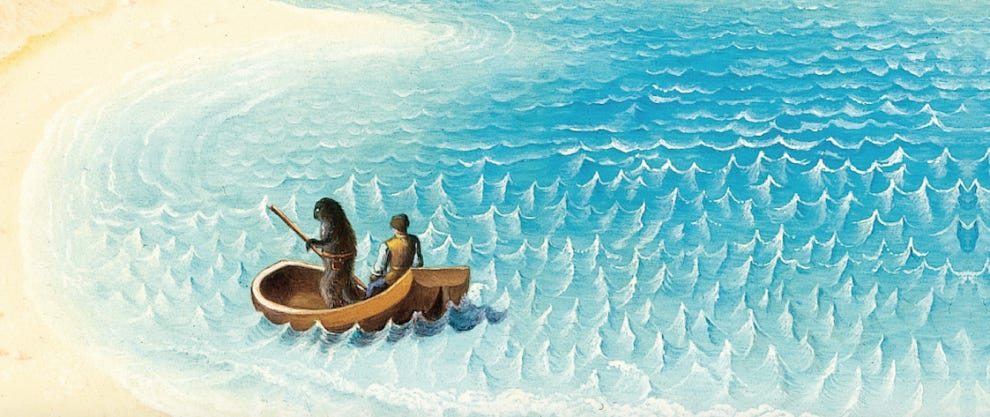
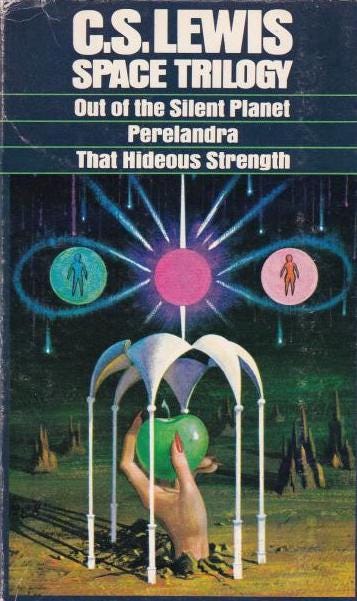
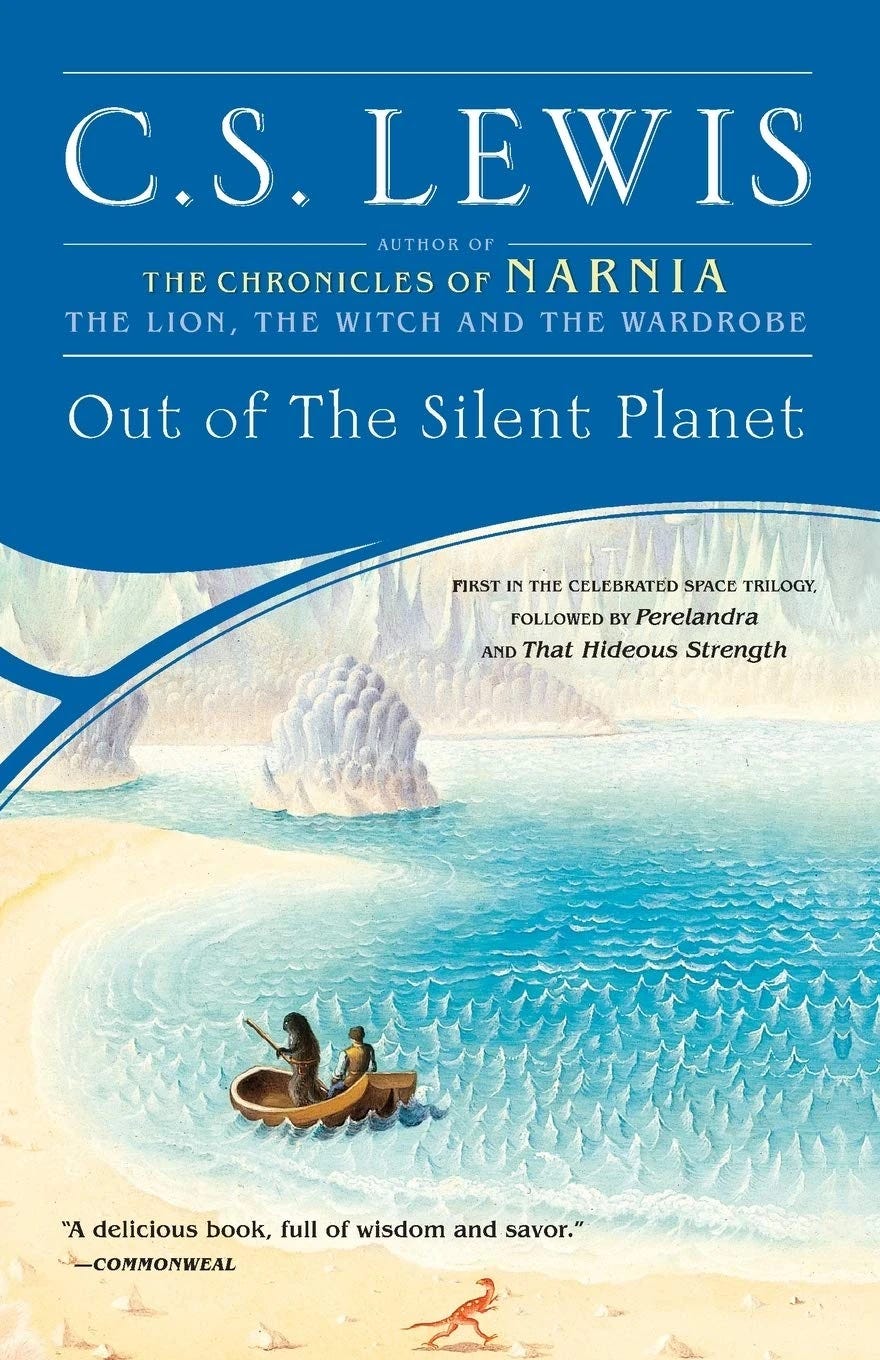
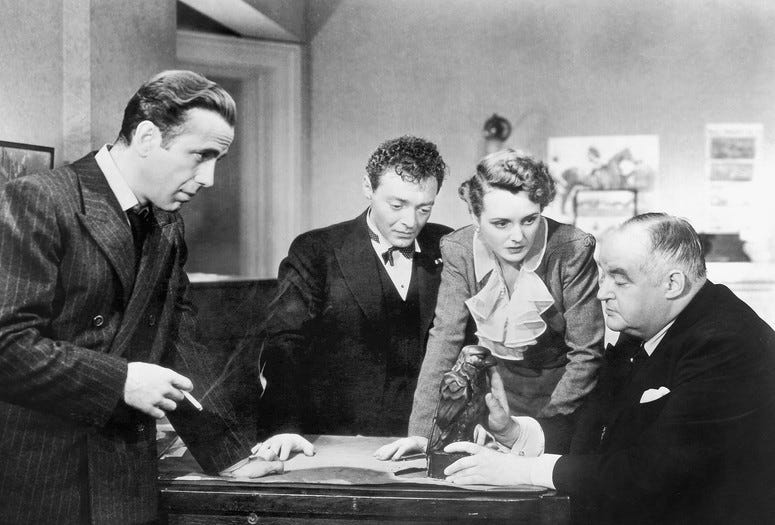
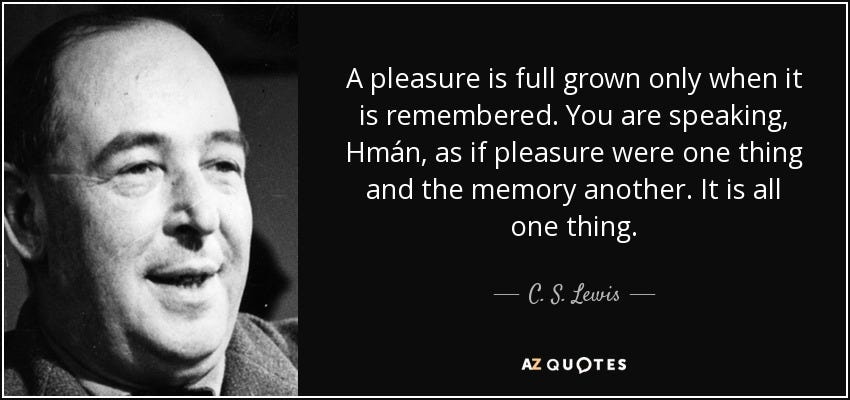
Thanks for this, Andy. It’s given me much to think about this afternoon. (As if my brain wasn’t bouncing in and out/around/between a multitude of different subjects already!) It’s also given me another book to add to the ever growing want-to-read list! 😆